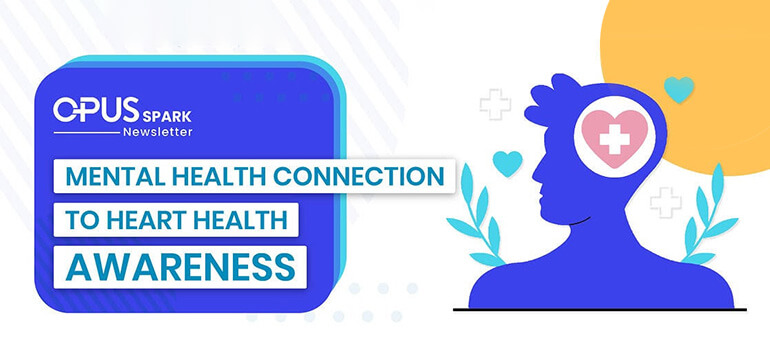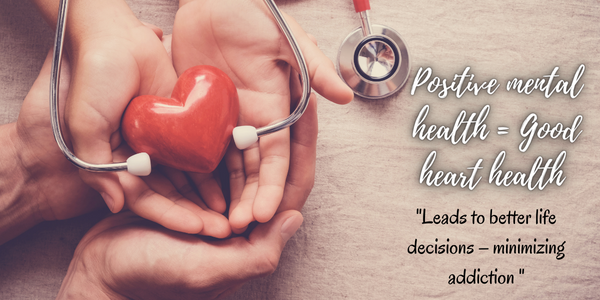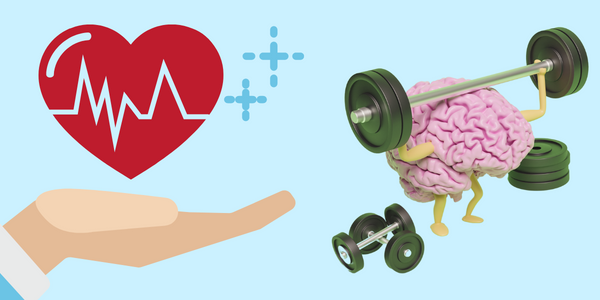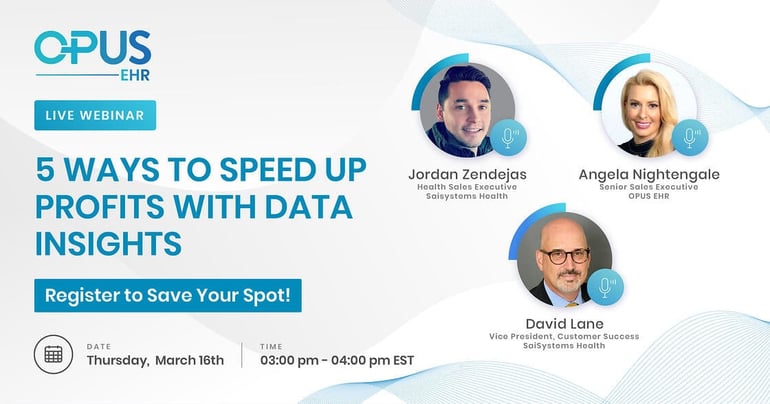
Opus Spark February 2023
CEO’s Message
As we observe American Heart Month this February, it is essential to recognize that our heart's health depends not just on physical factors like diet and exercise but also on our mental well-being. The correlation between mental health and heart health has been well-established in recent years, with studies showing that people with mental health conditions have a higher risk of heart disease.
Research has shown that people with depression, anxiety, and other mental health conditions have an increased risk of heart disease and stroke. For instance, people with depression are at a 64% higher risk of developing coronary artery disease compared to those without depression. Additionally, people with anxiety disorders have a 26% higher risk of developing coronary heart disease, while those with post-traumatic stress disorder (PTSD) have a 29% higher risk of developing cardiovascular disease.
The reasons behind this correlation are complex, but one potential explanation is that mental health conditions can lead to unhealthy behaviors that increase the risk of heart disease. For example, people with depression or anxiety may engage in smoking, physical inactivity, and poor diet choices, all of which are risk factors for heart disease.
Leading experts say that mental health conditions can also cause changes in the body that contribute to heart disease. For example, chronic stress can increase levels of stress hormones, which can cause inflammation and damage to the walls of blood vessels. This can lead to the buildup of plaque in the arteries, which can eventually lead to a heart attack or stroke.
Given the complex relationship between mental health and heart health, it is crucial to prioritize both aspects of our well-being. This means taking steps to support our mental health, such as seeking treatment for mental health conditions and practicing self-care activities like mindfulness and meditation. Additionally, it means taking care of our physical health by eating a heart-healthy diet, engaging in regular exercise, and avoiding harmful habits like smoking.
We encourage healthcare professionals to recognize the link between mental and heart health and incorporate mental health assessments into routine cardiac evaluations. Healthcare providers can help reduce their patient's heart disease risk by identifying and treating mental health conditions.
As we continue to recognize the importance of American Heart Month, it is essential to link mental and heart health by prioritizing both aspects of our well-being. We can help reduce the risk of heart disease and improve our overall health and quality of life. For example, by getting involved in a 5k walk or run, you can take healthy steps towards your mental health and heart health by searching for an event near you here.
Trey Wilson
Chief Executive Officer
Opus EHR
.png?width=649&height=787&name=Anthony%20(1).png)
Anthony Slenkovich, a Licensed Clinical Professional Counselor in the state of Maryland, was chosen as the clinician of the month by his team at Quince Orchard Psychotherapy. His managers recognize Anthony stating he is very dedicated to helping his clients. He has lived experience that makes him an excellent therapist. He is a fantastic listener and shows up consistently for his clients. Within the last 2 years at Quince Orchard Psychotherapy, Anthony has had 5-star ratings where clients value their therapy sessions.
He received his Master of Arts degrees in Clinical Mental Health Counseling and Counseling Psychology from Washington Adventist University. He has over a handful of years of experience walking alongside adults, young adults, and adolescents in the clinical and community setting. Through his experience, he has developed his craft of connecting and progressing with those working through bipolar and other mood-related experiences, anxieties, self-image, self-harm concerns, and with psychosis-related experiences.
Anthony sees every person he works with as a unique, resilient individual whose life matters and someone he may get to know and grow with. He feels that simply being present, actively listening, and earning trust are vital to utilizing therapeutic tools during the counseling process. As an eclectic counselor, he integrates elements from person-centered, cognitive behavioral, psychodynamic, and psychoanalytic approaches, as well as tuning in to various dialectic/mindfulness exercises.
Anthony believes that insight into one’s mental health can be fostered together through learning, and healthy change can be realized through guidance.
Join us for our upcoming webinar, "5 Ways to Speed up Profits with Data Insights," held on Thursday, March 16th, at 3 pm est./12 pm pst. We will have our billing solutions experts speak on data insights and business growth by getting reimbursements!
- Learn how you can use data to make informed decisions about your clinic's operations
- Discover how you can streamline your clinic's procedures for improved efficiency
- Get ahead of the competition by learning the latest trends in data-driven treatment centers
In this live discussion, billing expert speakers dive deep beyond the practices of basic reporting. We will share how you can dig into your information through filtering options to view through customized dashboards for more informed decision-making, where users will have full transparency into their data.
We will cover the following:
- Data Transparency
- Custom-built reports and dashboards to fit your operations
- Integrate data resources - full system communication
- Remove 3rd party delays - seamless operation - results
- Drill-down capabilities
Register to save your seat here and get the recording!
Managing the billing and reimbursement process can significantly challenge behavioral health practices. Insurance companies' complex billing requirements and the continually evolving regulations around mental health billing can make it challenging for practices to receive full reimbursement for services provided. However, with Opus RCM Services with data analytics, behavioral health practices can gain greater insights into their billing processes and optimize their billing management for improved financial outcomes.
Opus RCM Services is a comprehensive revenue cycle management solution that provides billing and coding support for behavioral health practices. Using advanced data analytics, Opus RCM Services analyzes a practice's billing data to identify areas where revenue can be increased and provides recommendations for improving billing practices.
One of the significant benefits of Opus RCM Services is that it provides greater insights into coding practices. With the help of data analytics, Opus RCM Services can identify coding errors or inefficiencies that may be reducing reimbursements. By identifying these issues, behavioral health practices can optimize their coding practices to ensure that they are receiving the maximum reimbursement for services provided.
In addition to providing insights into coding practices, Opus RCM Services also provides recommendations for optimizing the billing process, including streamlining workflows and reducing errors. This can help practices save time and resources while improving their financial outcomes.
Opus RCM Services' data analytics can help practices understand the financial performance of their practice more comprehensively. Through detailed analytics reports, practices can gain insights into their financial performance, identify areas for improvement, and make data-driven decisions.
Overall, Opus RCM Services, with data analytics, provides behavioral health practices with greater insights into their billing processes, enabling them to make informed decisions and optimize their billing management for better financial outcomes. By identifying coding errors and inefficiencies, streamlining workflows, and reducing errors, practices can improve their financial outcomes and focus on providing quality care to their patients. Learn more about our services by scheduling a meeting with our experts here!
Schedule a Complimentary Revenue Analysis

The correlation between positive mental health and positive heart health is well-documented in scientific research. Studies have shown that individuals with better mental health have a lower risk of heart disease and a better overall quality of life.
One study published in the Journal of the American College of Cardiology found that individuals with a positive outlook and good mental health had a 35% lower risk of developing heart disease than those with poor mental health. Additionally, people with depression and anxiety were found to be at a higher risk of developing heart disease, indicating the significant impact of mental health on heart health.
A positive mindset is linked to better life decisions, including healthier eating habits, regular exercise, and avoiding harmful habits like smoking and excessive alcohol consumption. This is supported by a study published in the Journal of Health Psychology, which found that individuals with positive attitudes toward health were more likely to engage in healthy behaviors, leading to a lower risk of heart disease.
Additionally, positive mental health has been found to help prevent addiction.
Studies have shown that individuals with depression and anxiety are at a higher risk of developing addiction, including substance abuse, gambling, and internet addiction. Individuals can reduce their risk of addiction and other harmful behaviors by prioritizing mental health and seeking treatment when needed.
The correlation between positive mental health and positive heart health is clear. By prioritizing mental health and maintaining a positive mindset, individuals can make better life decisions that support their heart health and overall well-being. Seeking treatment for mental health conditions and practicing self-care activities like mindfulness and meditation can go a long way toward promoting positive mental and heart health.

- Centers for Disease Control and Prevention: Behavioral Risk Factor Surveillance System
- Centers for Disease Control and Prevention: Interactive Atlas of Heart Disease and Stroke
- Centers for Disease Control and Prevention: Mental Health
- Centers for Disease Control and Prevention: National Health and Nutrition Examination Survey
- Cleveland Clinic: Depression & Heart Disease
- National Institute of Mental Health: Chronic Illness & Mental Health
- Substance Abuse and Mental Health Services Administration (SAMHSA)–Health Resources and Services Administration (HRSA): Center for Integrated Health Solutions
- World Health Organization: Mental Health

Mental Health Conditions Related to Heart Health
Mental health is about more than just the absence of a mental health condition – it is about a state of well-being that enables people to cope with stresses and contribute to their community. People experiencing mental health disorders may adopt unhealthy behaviors, increasing their risk of heart disease. Mental health disorders can also lead to physiologic effects on the body, leading to calcium buildup in arteries, metabolic disease, or heart disease. Mental health disorders can develop after an acute heart disease event due to pain, fear of death or disability, and financial problems associated with the event. Some antipsychotic medications have been linked to obesity, insulin resistance, diabetes, heart attacks, atrial fibrillation, and stroke. Early addressing mental health conditions by providing access to services and support helps reduce someone’s risk for a heart disease event. Healthcare systems should employ clinical decision support teams with mental health and heart disease professionals. Healthcare professionals should learn more about the link between mental health and heart disease and discuss it with patients. Individuals should recognize signs of mental health disorders and know which conditions increase. Anxiety and depression are common mental health conditions associated with heart disease.
Anxiety
There are many types of anxiety disorders, and their symptoms can vary. Some common signs and symptoms include:
- panic attacks
- racing heart
- hot and cold flushes
- tightening of the chest
- shortness of breath or difficulty breathing
- obsessive thinking and compulsive behavior
- excessive worry, fear, or catastrophizing
- avoiding situations that may cause anxiety.
Living with heart disease is one of many things that can trigger anxiety. The good news is there are many ways to manage and treat anxiety.
If you’re suffering from anxiety, the sooner you get help, the sooner you can recover.
Depression
Depression affects how a person thinks, feels, and acts. Some common signs and symptoms of depression include:
- loss of interest in activities you used to enjoy
- withdrawing from family and friends
- being unable to concentrate and not getting things done at work or school
- feeling overwhelmed, having difficulty making decisions, and lacking confidence
- increased alcohol and other drug use
- loss or change of appetite
- significant weight loss or gain
- trouble getting to sleep, staying asleep, and being tired during the day
- feeling worthless, helpless, and guilty
- increased irritability, frustration, and moodiness
- feeling unhappy, sad, or miserable most of the time
- negative thoughts such as, ‘I’m a failure,’ ‘Life’s not worth living,’ and ‘People would be better off without me.’
Like anxiety, there are effective treatments available, and it is important to seek help early.
Social Isolation, Loneliness, and Mental Health
Positive and respectful social connections are important for our mental and physical well-being. Feeling lonely or being socially isolated has been linked to an increased risk of mental health issues, such as depression, anxiety, and suicide.
Links between mental health conditions and heart disease
Anxiety, depression, and coronary heart disease are common conditions and often occur together.
Mental health conditions – such as anxiety and depression – can develop after having a heart attack or heart surgery.
Depression and anxiety are both independent risk factors for heart disease.
Depression can affect the recovery of people with coronary heart disease and increase their risk of further heart problems, such as another heart attack.
People who experience loneliness or social isolation have an increased risk of coronary heart disease and stroke.
Looking after your mental health and heart health
You can do many things to improve your mental health and heart health. These are especially important if you have heart disease.
Tips:
- Speak with your doctor
- Speak with a therapist, psychologist, psychiatrist, counselor, mental health nurse, occupational therapist, and social worker.
- Make healthier lifestyle choices such as staying active and eating healthy, getting enough sleep, avoiding excess alcohol, and quitting smoking
- Seek support and stay connected to your community
- Be in nature
Our team is constantly adding new tools and innovating features that practices need as we get feedback from our valued clients.
If you are interested in upgrading your operations by giving Opus EHR a try;
Watch our demo: https://bit.ly/opusehrdemo
Start your complimentary 21-day trial today: https://bit.ly/opustrial.



